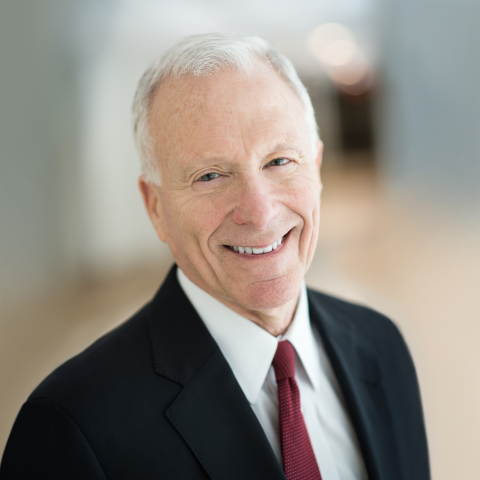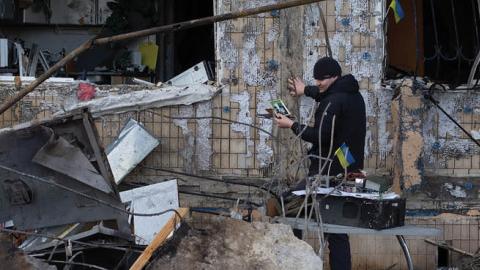‘In war,” the saying goes, “the enemy gets a vote.” As the Ukrainian war enters another brutal week, American views about it are coalescing. Prudence suggests that we consider whether our adversaries see developments as we do. Here are seven commonly expressed views on which our adversaries may have a different take.
Unable to seize Ukrainian cities, Putin shells them as an act of desperation. Perhaps, but the shelling might rather be an act of policy. Russian forces may be stalled by awful logistics or President Zelensky’s defiance, but once he faced stout Ukrainian resistance, Putin might well have chosen to pound the cities from outside before sending his troops into defended alleyways. In 1945, Putin’s hero, Stalin, took control over rubble-strewn Central Europe more easily because survivors prioritized survival over resistance. Massive shelling of cities was Putin’s way in Syria and Grozny, too. Civilian flight also eases Putin’s future troubles and burdens the West. While democracies shun wanton brutality, Putin evidently embraces the fear it inspires.
NATO, revived, stands strong and united. Perhaps, but to many around the world, NATO may look like a turtle withdrawn into its shell. NATO did little before the invasion, while Russia threatened Ukraine, and then wouldn’t directly confront Putin’s unprovoked assault and crimes against humanity — even though they were right next door. NATO boasts that it will defend its borders, but it shrinks from venturing a toe outside. NATO provides weapons, but not those it fears Putin might find too provocative. Vulnerable nations around the world may see NATO diminished as a force beyond its borders – to our adversaries’ delight.
Putin miscalculated the price he would pay. Perhaps, but to take part of Ukraine — or, in Putin’s eyes, retake what was once and should forever be part of Russia — and to humiliate NATO, Putin might be willing to endure even greater costs. In January, as he massed forces near Ukraine, he might have expected NATO to defend at least the western part of Ukraine or to intervene to stop widespread war crimes; but President Biden promptly assured him that America would not fight. Putin might feel relieved to face only Ukrainian forces and temporary sanctions that will impose costs far lower than those he might have expected. Russians still pride themselves on enduring millions of casualties to rescue western Russia from the Nazis in World War II; Putin may see the costs of rescuing Ukraine for Russia today — an historic achievement in his eyes — as small by comparison. Putin, in claiming to “de-Nazify” Ukraine, likely seeks to invoke this perspective. For him, recovering Ukraine may be worth losing conscript battalions, delaying some oil sales, enduring economic boycotts, and letting the world seize other oligarchs’ yachts.
Russia’s attack has stalled and won’t succeed in reaching Lviv. Perhaps, but, if forced, Putin may be content for now to accept a ceasefire under which Ukraine forswears NATO membership and Russia is left in control of yet another big chunk of Ukraine. His gains might include widening a land bridge from Crimea and controlling more ethnic Russians, minerals, agricultural riches, seaboard, and claims to Black Sea resources. If that is his bottom line, rapidly taking Kyiv is less important than diverting Western focus from Putin’s progress in southern Ukraine. Later, he may hope, Zelensky’s Ukraine would be reduced to a demoralized and impoverished rump that a newly created puppet state of Russia would unsettle with propaganda, cyber intrusions, infiltrated fighters, and assassinations — operations at which Russia excels. Putin could come back for more then, as he did after seizing Crimea in 2014.
Putin is finished as a force in the world. Perhaps, but he may be thinking about how the world will look in 2023 and beyond. By then, he may calculate, the world’s hunger for resources he controls — oil, gas, minerals, and wheat — will outweigh the West’s waning outrage. Where else will Europe turn, if America, focused on climate change, won’t provide enough energy? And how long will Europe want to house, say, 5 million Ukrainian refugees? He can always send more. Won’t Europe negotiate to save Mariupol’s abandoned children? Will the democracies want to see Russia sell advanced arms, including nuclear or biological weapons, to terror states? Liberal states that ignored Putin’s concerns before the invasion may sanction and berate him for a while — they have before — but, Putin may calculate, the concerns of a reunited and more assertive Russia won’t be blithely disregarded anymore.
**Even if Ukraine falls, NATO will support an ongoing insurgency that, like Afghanistan, will topple Russia in time.** Perhaps, but Putin may believe he can isolate and survive any insurgency. If insurgents threaten his gains in Ukraine, he may strike at their support lines, even if that means striking inside NATO’s borders. Putin might calculate that Biden and NATO would then cut off the insurgents, rather than risk a direct confrontation and nuclear war with Russia. If NATO were willing to risk war, Putin might reason, it would have done so when 40 million Ukrainians were eager to defend their country. Why would NATO abandon a battle fought largely by Ukrainians in Ukraine but then take up their cause when the bulk of the fighting would have to be done by NATO’s own forces, including on NATO soil? Putin might expect to limit damage from any insurgency by helping a newly created puppet Ukraine build an oppressive surveillance state — perhaps with the aid of Chinese technology, technicians, and “peacekeepers” (offered under the guise of speeding Ukrainians’ recovery, of course). While he might expect violence to continue, Putin might view ongoing turmoil in a puppet Ukraine as preferable to a rearmed Ukraine aligned, de facto or de jure, with NATO. He rose to power exploiting violence in Chechnya. With Ukraine as his pillow, he may count on sleeping soundly through sporadic terror in Kharkiv.
China miscalculated, too, and regrets its ties to Putin. Perhaps, but President Xi may see China as the biggest winner here. Just as Stalin in the 1930s encouraged Germany’s war with Western Europe, Xi might relish the prospect that Europe and Russia would tie themselves into knots, with Putin increasingly dependent on China’s support, and the West courting China to restrain him. For years China has similarly exploited pleas to curb North Korea. Xi may take comfort from the West’s reluctance to cut off Russian oil, believing that the West will be even more likely to pale before braving China’s greater economic leverage. Chinese diplomats might remind Asian capitals that the West won’t even defend white, Christian democracies on NATO’s border, while the rubble of defiant Kyiv would serve to focus Asian leaders on the costs of defying China’s ever more capable arms. After Ukraine, Xi’s hopes of winning Asia without a fight may soar.
Events may be countering some of our adversaries’ calculations, but considering their perspectives may help us avoid our own errors.
Read in National Review


















